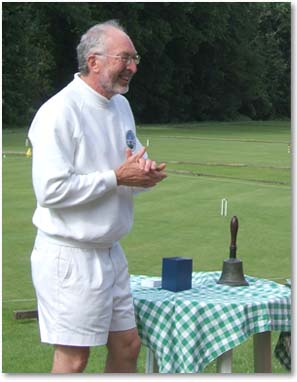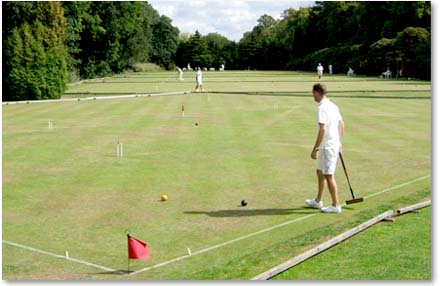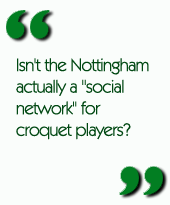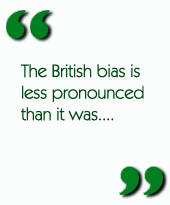

|
Back to |
| The Front Page |
| People |
|
Chatting with the master of croquet's Nottingham List |
|
an email interview with Ian Vincent Posted November 4, 2012
|
BOB ALMAN: My email address was seriously pirated recently and I noticed that the Nottingham Board as well as all my individual addresses was spammed. So I need to ask you, as creator and manager of the Nottingham list, what have you done to prevent subscribers getting spam by riding on the coattails of hundreds of croquet players around the world who have the Nottingham List in their address books--and what might you do in the future?
In January 1995, as the use of email was expanding beyond the academic world, Ian Vincent was a croquet player and staff member of the Computing Centre of Nottingham University when Dr. Martin Murray suggested that a mailing list for the discussion of croquet would be a good idea. So the Nottingham Board appeared a full year ahead of my creation of the USCA website in 1996--when most people still didn't know what "dot-com" meant. The Nottingham Board quickly became a meeting place for many of the top players in the world, and it has retained its peerless stature ever since, in spite of technological advances in cyberspace that make it seem primitive when compared to Facebook or Twitter. After some hesitation, Ian agreed to be interviewed.
IAN VINCENT: Although a couple of spam messages were recently sent to and distributed by the Nottingham List from your AOL account, I think that spam from the list is a comparatively rare event (though some readers may feel that a lot of the content from some contributors could be categorised under that heading!). There are two mechanisms in place to reduce spam. The first is that only messages from subscribers to the list are accepted, so spammers who have scraped its address from websites will not succeed (they don't seem to go to the effort of registering!). The second is that all messages are filtered through spam and virus checkers. It so happened that the one from your account not only passed the spam checker that I run, but also a different one run by a commercial organisation, so it was either very new or fairly innocuous. Given that it is a relatively rare problem, I currently have no plans to change the setup.

|
| In receiving an award from his club, Ian Vincent reveals the combination of attention and delight that established his reputation as "The Good Doctor." |

|
| With five croquet lawns and shared use of three adjacent bowling lawns in Highfields Park, the Nottingham club is one of England's major competitive venues. As many as ten Croquet Association tournaments are played there each year, assisted by many volunteers from the club's 100-member roster. In 2013, the club will host the qualifier for the WCF Association Croquet World Championship. |
IAN: The simple answer is shorter than your question: the list is advertised as being unmoderated. The information page starts by saying: "This list is for general discussion of issues related to playing croquet. Messages to the list are unmoderatored and neither Ian Vincent, who is the list administrator, nor the Croquet Association, take any responsibility for the views expressed on it."

|
| The Trent Building was the first new structure on Nottingham University's original campus, given with the adjacent Highfields Park to the City of Nottingham by Jesse Boot, later Lord Trent, founder of Boots the Chemist. |
There were several reasons why I adopted this policy from the outset. The first one is simply that it would take too much of my time to check each message: so far this year there have been an average of 20 a day. (It wouldn't just be the time to assess them, but time needed to deal with the inevitable complaints from people who disagreed with my judgement!). Moderation would delay the messages appearing. I also suspect that it would considerably alter the character of the list, which would be seen as a forum for my views, rather than those of the contributors. Finally, acceptance of a message could be taken as some sort of approval of its content, opening me to the risk of litigation by someone offended by it.
BOB: Good and sensible answer! Now we've backed into what should have been my first question: How did the Nottingham list get started?
IAN: The list was created for me in January 1995 by a colleague, using software called Majordomo, on the University's Unix mail server. My memory is that the suggestion for starting it came from Dr. Martin Murray, a former international test player and chemistry lecturer at Bristol University, who also had an e-mail account. He, myself, and another person at Bristol were the first three subscribers.
BOB: Has it been "improved" in function in since? How?
IAN: The first significant change was a switch from Majordomo to Mailman as the underlying software, which provided a much more usable, web-based, interface for people to (un)subscribe and for me to adminster the list. It also gave the option to get messages as a daily digest rather then individually. The other big change came when I retired from the University, at which point I moved the list from one of its servers to a virtual server rented from a hosting company called Bytemark. At that point the domain name changed from nottingham.ac.uk to nottingham-lists.org.uk ... hopefully no-one is still using the old one!

BOB: The Nottingham Board was begun way back in the mists of time, when these kind of fora were very new and not many people had email accounts, but the technology is now changing at almost a daily pace. Have you considered converting to something that looks and acts more contemporary? I'm not necessarily suggesting this, incidentally; I don't want to Tweet, and I find Facebook incredibly tedious. (I committed FB suicide about three years ago.)
IAN: People occassionally suggest that e-mail lists are out of date, and hence that it should be replaced by a web-based message logging facility, or a social messaging service such as Facebook or Twitter, but I see little incentive to do so. People who feel they are being swamped by messages from the list can either opt to receive the digest, or use mail filtering technology (or even a separate e-mail account) to separate the messages from the list into a separate folder, to examine at their leisure.
BOB: It seems to me that the Nottingham Board actually does constitute a "social network" of a specialized kind, but without the distracting bells and whistles of FaceBook and Twitter. Posters are able to make brief comments or examine issues at greater length and in great detail, which subscribers can read or not. How many subscribers are there, by the way?

IAN: There are currently 532 subscribers receiving messages (the list software automatically blocks addresses for which messages are rejected after a number of failed attempts to send them). Up to the time of writing, 5429 messages have been sent via the list this year, from 259 different addresses in all. The most prolific author sent over 650 of them, and there were a dozen people who sent more than 100.
BOB: Those dozen are the "stars" of the board, and some of them invite a great deal of abuse, mostly from the Brits. It's my impression that debating for the sake of debating and scoring points--as distinct from exploring the truth of the matter--is the most British of games, a particularly rude and acerbic style of discourse we witness in parliamentary debates on BBC America. It takes a while for an American to get used to it, but I think perhaps the other members of the Commonwealth are more comfortable with it. Maybe that's the reason American participation on the board is so very limited. We're afraid of getting attacked and eviscerated by the Brits! Have you any advice for Americans or other colonials who may feel shy about venturing onto the Board?
IAN: Don't be shy about sending messages. If you have some useful information to contribute it will generally be well received, and if you have a question, the points scorers are far more likely to have a go at each other than a stranger and will usually give a helpful reply.
BOB: I'm not a stranger, but I feel that Croquet World Online gives me a big voice already, and that I really should use the board sparingly and only for announcements that many subscribers will be interested in seeing. I would feel very, very shy about using the Nottingham Board to deliver an opinion or present an argument for one position or another, unless I have special information. You're a very organized chap. How do you characterize all the different types of Nottingham postings?
IAN: Mostly, I think of them in five categories:
- * Announcements or advertisements of forthcoming events;
- * News, results or commentary;
- * Requests for help or information and the replies to them;
- * Debate about matters of current interest--which sadly sometimes degenerates into personal abuse;
- * Humour.
- * News, results or commentary;
BOB: I'd say most of that technical information is already online in a more digestible form, especially Ian Plummer's excellent a Oxford Croquet site. But by the same token, some of the new Nottingham postings were eventually fashioned into Oxford Croquet site articles. The short-term "news of the day" can be very tedious--especially the coded play-by-play commentary of major events which, I'm sure, only a few people want to follow.

IAN: And you've probably noticed that kind of traffic is increasingly being directed to specific blogs or websites, which are much better for that purpose--especially because email is not guaranteed to arrive in the order it is sent! But it is probably the latter two categories that readers find most off-putting. Debates can become quite long and technical at times and, if they get overheated, can tend towards personal abuse, for which there should be no place on the list. Others, however, have generated useful insight into a topic which a number of people have considered in depth. Some of the humour can be very funny, but some readers may find it offensive.
BOB: Not just offensive, but peculiarly British! I'm very aware of language and cultural differences, and I try to write and edit Croquet World articles in the "North Atlantic English" style--that is, in language that can be clearly understood on both sides of the Atlantic.
IAN: The British bias of the list is probably less pronounced than it was, as croquet has become more international; and the Croquet Association website has developed to provide an alternative source of news and information about British events. As you will have seen from the figures above, most subscribers seldom post to the list, they just read it. And I'm sure most subscribers have one finger on the delete key and hit it when the subject line suggests that the message will not be of interest. (You can always retrieve it from the archive if you later find that it was.)

BOB: My impression as a long-time subscriber is that the board is used for exploring and conditioning many items on a global basis that may or may not have been addressed in depth by national or international bodies, and that the discussion on the Nottingham Board (no matter how long or tedious to some) actually contributes to the clarity and resolution of many of the issues that will come to the Management Committee of the WCF, for example, in an advanced form. What Nottingham discussions have made the most difference, in your view, in advancing a conversation of global relevance?
IAN: That's not easy to answer comprehensively without trawling back through the archives, but the discussions about what could be done to make Association Croquet more challenging for the very top players has led to the trials in the UK of "super-advanced" play (though the jury is still out as to whether that will ultimately be seen as the solution). Views about the volatility or otherwise of the ranking system may have contributed to the review that led to the recent change to dynamic grading, though I'm aware that most of the detailed technical discussions were off-list. Concerns about dead games in qualifying blocks (which were discussed well before the recent problems with badminton pairs tanking in the Olympics), led to the development and introduction of the Burridge Swiss format, and subsequent discussions may lead to its refinement.
The sister list, croquet-laws,, proved particularly valuable when the last revision of the AC Laws was being carried out, as a sounding board for the proposed changes.
BOB: This could be the last question, Ian: Are you afraid this article will generate too many new subscribers to the list? And a related question: would it be possible to have too many subscribers, if only a couple of hundred of them a year ever post anything?
IAN: Little chance of that, given the relatively small number of croquet players and the power of modern hardware. I think a bigger risk is that the online croquet community will fragment, with other people or even national associations setting up alternative forums. Martin French, the WCF Secretary General, made just this point in a recent post to the list.
BOB: But your list is part of the international croquet culture. It wears well, like an old shoe. Both its faults and its virtues are old-fashioned. I have a feeling we wouldn't want to do without it, and that you'll be moderating it for a long time to come.
ABOUT IAN VINCENT
After being introduced to croquet as a teenager while visiting relatives in Ireland, Ian rediscovered the game as an undergraduate at Downing College, Cambridge. He played in his first major event at Southwick, in
1972, off a five handicap. After researching Theoretical Chemistry at Sussex University, he became Hon. Secretary of the Nottingham club upon moving there to take up a post in the Cripps Computing Centre of Nottingham University, where he was encouraged to set up the Nottingham Board in 1995.
He was trained as a referee by David and Betty Prichard, on a course they ran at Wrest Park, and his interest in the laws of the game eventually led to his becoming the Croquet Association's representative on the International Laws Committee. He successfully stood for election to the Croquet Association's Council, and in due course was invited to chair it. After he retired from the University, he was elected to serve as its
Hon. Secretary--a position he still holds.
Croquet has become a primary focus of Ian Vincent's life. In his words, "I have been extremely fortunate to have made so many good friends while playing croquet, and I am very grateful for all the kindness they have shown me. In particular, I met George Noble when I moved to Nottingham, who invited me to stay and play with him in the Open Championship when he moved to London, a playing partnership that has survived for over thirty years. Another longstanding interest of mine is bellringing, which, though essentially co-operative rather than competitive, has many aspects in common with croquet. One of these is a emphasis on record keeping, and I find that by a happy coincidence I have rung about as many peals as I have done triples!"